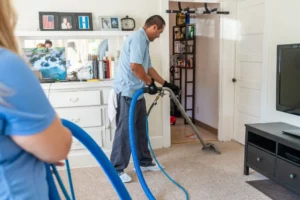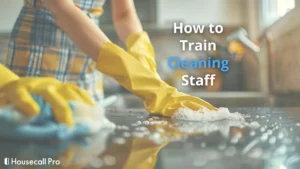
Want to see your potential revenue?
See what businesses like yours earn with Housecall Pro in 1 - 2 minutes.
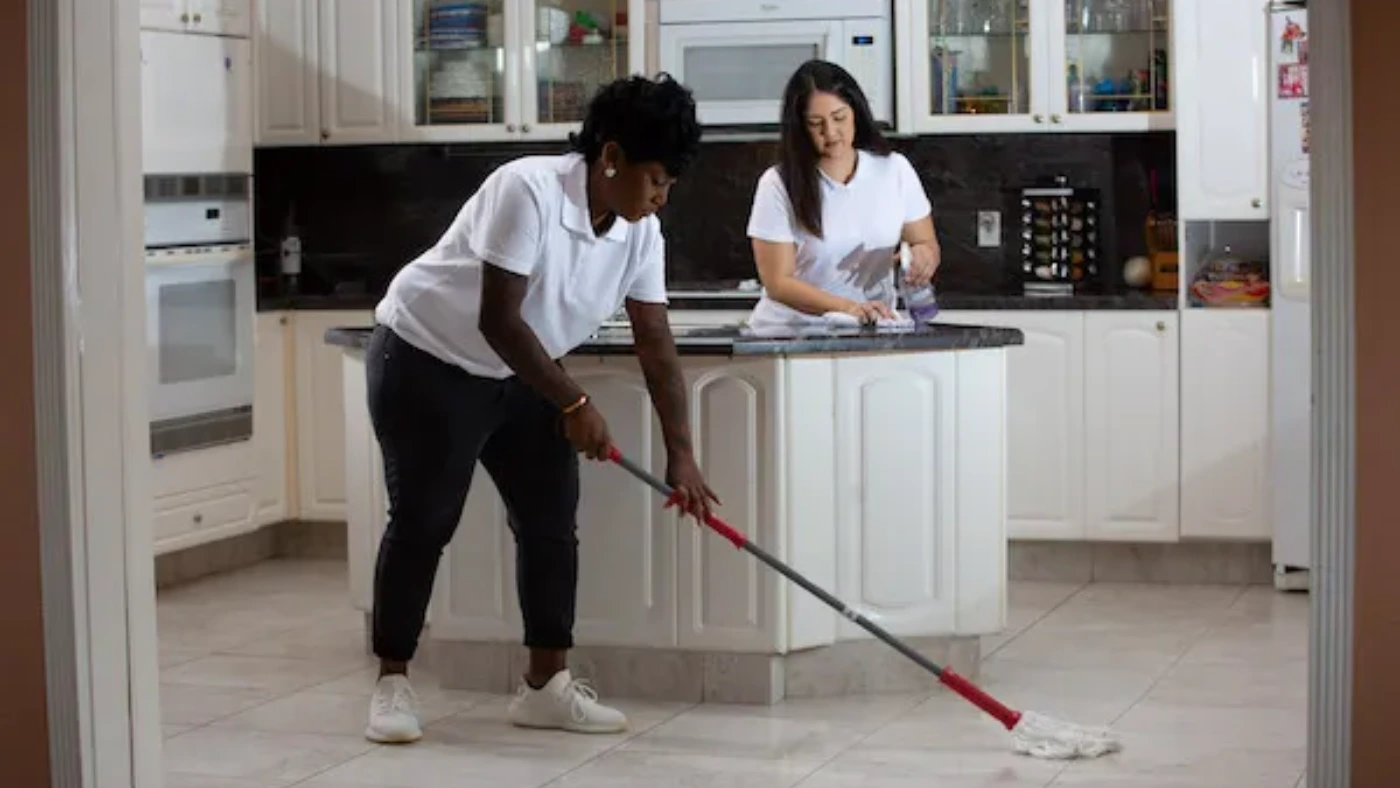
Starting a cleaning business is a great way to build steady income and gain the freedom to be your own boss. The industry is in high demand, with expectations to grow past $600 billion by 2030. It’s also pretty easy to jump in: Startup costs are low compared to many trades, making this a great opportunity whether you’re a first-time entrepreneur or an experienced operator.
If you’re wondering where to begin, our guide walks you through how to start a cleaning business from drafting a business plan to marketing your company and growing your business.
Cleaning business startup checklist
- Step 1: Create a cleaning business plan
- Step 2: Get a cleaning business license and insurance
- Step 3: Choose your cleaning services and set pricing
- Step 4: Buy cleaning supplies and equipment
- Step 5: Market your cleaning business
- Step 6: Find cleaning clients
- Step 7: Grow your cleaning business
- How much does it cost to start a cleaning business?
- How Housecall Pro’s cleaning business software can help
Step 1: Create a cleaning business plan
A strong business plan clarifies your vision, defines your market, and provides a map to reach your goals. Your cleaning business plan doesn’t need to be complicated, but it should be thorough. If you want expert help, working with a professional business plan writer can help structure the plan correctly and meet lender expectations.
Here are some key sections to include:
- Executive summary: Short overview of your mission and goals (it helps to write this last)
- Company description: Your background, niche, and unique selling points
- Business goals: Short- and long-term revenue and client targets
- Products/services: Cleaning services offered (residential, commercial, specialty)
- Market research: Local demand, competition, customer needs, market gaps
- Marketing plan: How you’ll attract, retain, and upsell clients (both digitally and offline)
- Financial analysis: Startup costs, funding plan, and 12–24 month projections
- Operations: Legal structure, management, staffing
- Appendix: Copies of licenses, certifications, contracts, and other supporting docs
You can download our cleaning business plan template as a great starting point.
Research your market and competitors
The global cleaning services market was estimated at $415.93 billion in 2024 and is projected to grow to $616.98 billion by 2030. This means there’s a lot of potential to succeed, but a lot of competition to get there. That’s why market research matters.
Start by identifying competitors in your area using tools like Google Maps, Yelp, or local business directories (consider looking through your local chamber of commerce website). Search for terms like “house cleaning near me” or “office cleaning services in [your city]” to see which companies pop up. Take note of:
- Their service offerings: Do they focus on residential, commercial, move-in/move-out, or specialty cleaning?
- Pricing structures: Flat rates, hourly rates, packages?
- Customer reviews: What are people praising or complaining about?
- Marketing channels: Do they have a website, use social media, offer promotions?
Once you’ve gathered your data, look for market gaps. For example, are there neighborhoods without providers, limited eco-friendly options, or repeated complaints about reliability? The goal is to find ways to stand out.
“If I could start over again, I would rather be the go-to cleaner for one area than an unknown name everywhere,” says April Prothero, founder of the nontoxic cleaning company Going GreenHouse. “Pick a small market, build your reputation there, then expand.”
Choose your niche
Choosing the right niche can help you focus your efforts and create a clear identity so customers immediately see why they should choose you over a competitor. Instead of trying to serve everyone, think about the type of customer you want to target and what unique attributes you can bring to the table.
“Start where you and your product can provide the most value,” says Brian Davis, CEO of Handy Rubbish. “Residential might sound like a no-brainer, but many of the specialty services, like waste removal or after-build cleans, have higher margins—and in some cases, less competition.”
Here are some popular cleaning niches to consider:
- Residential cleaning: General house cleaning, often with lower startup costs and flexible scheduling.
- Commercial/office cleaning: Typically done after hours with potential for long-term contracts.
- Carpet or upholstery cleaning: Requires specialized equipment but can allow you to charge higher rates.
- Window washing: Good for both residential and commercial spaces; may involve safety gear.
- Gutter cleaning: Fluctuates with seasonal demand; involves ladder work and exterior access.
Set business goals
What do you want your cleaning business to accomplish, and how are you going to get there? Set both short-term goals, like gaining your first 10 clients, and long-term goals, like hitting a target revenue or hiring staff.
Pro tip: Many cleaning business apps and websites offer free templates to help beginners map out realistic milestones.
Step 2: Get a cleaning business license and insurance
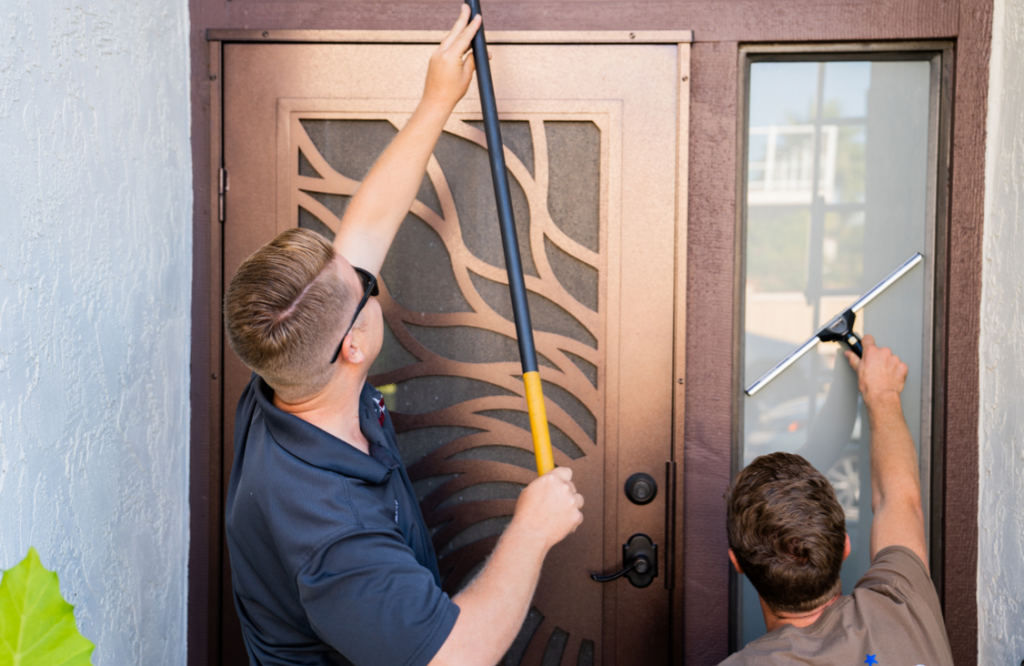
Before you start booking clients, you’ll need to make sure your business is set up legally and protected from risk. Getting a proper business license and insurance not only keeps you compliant with local regulations, but also shows clients you’re a legitimate, professional company. This is especially important when working in commercial spaces or entering someone’s home—people want to feel safe knowing you’re covered.
Choose a business structure
Your business structure affects your liability, taxes, and ability to grow. We’ll go over your options below, but check with a legal advisor or accountant to choose the right structure for your goals.
Sole proprietorship
This means you run everything yourself, and there’s no legal separation between you and the business.
- Pros: It’s quick, cheap, and easy to set up. Paperwork is minimal, so you can get started right away.
- Cons: You’re personally responsible for any debts or legal issues. If something goes wrong, your personal assets could be at risk.
Limited Liability Company (LLC)
An LLC is one of the most popular choices for small cleaning businesses. It gives you liability protection, meaning your personal assets are separate from your business.
- Pros: Protects your personal finances if something happens and offers flexibility with taxes and operations.
- Cons: A bit more expensive than a sole proprietorship and involves some paperwork, but it’s usually manageable.
Partnership
If you’re teaming up with a friend, family member, or business partner, you might set up a partnership. You’ll share profits, responsibilities, and decision-making.
- Pros: Easy to set up, and you can split startup costs and responsibilities.
- Cons: Both partners are personally liable for debts, and disagreements can sometimes cause friction.
Corporation (C Corp or S Corp)
Corporations are usually chosen by larger businesses, but they’re an option if you plan to scale big or take on investors.
- Pros: Strong liability protection and potential tax advantages.
- Cons: Much more complicated to set up and maintain, with ongoing regulations and compliance requirements.
Pro tip: You can start simple and change structures later. Many cleaning companies start as sole proprietorships or LLCs and transition to more complex structures once they expand.
Obtain necessary licenses and permits
Most cleaning businesses need a general business license and a local contractor permit. Depending on where you live and work, there may be other requirements like health or sanitation certifications.
Requirements can vary widely based on location and the type of cleaning services you offer. Always keep copies of all permits on file to stay compliant during inspections or client onboarding.
Pro tip: With Housecall Pro, you can store digital copies of your licenses and insurance to keep everything organized and ready for when you need it.
Buy cleaning business insurance
At minimum, get general liability insurance to cover property damage or injury to others. If you plan to hire employees, add workers’ compensation. Consider bonding needs and commercial vehicle insurance for company cars, if applicable.
Get quotes from providers like The Hartford, Progressive, USAA, and Next Insurance, and compare coverage to find the best fit for your business.
Step 3: Choose your cleaning services and set pricing
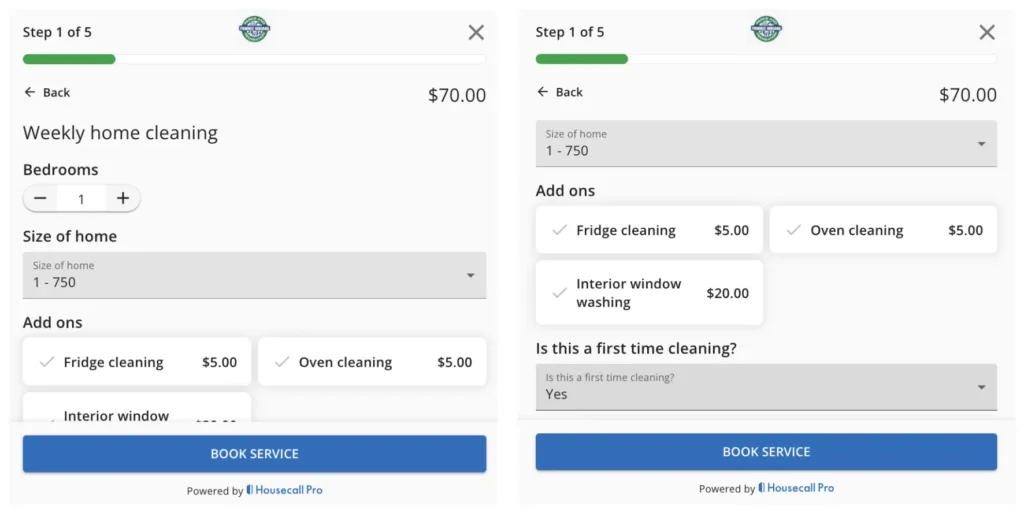
When you’re first getting started, trying to offer every service to every client will be more than you can bite off. Focus on what you can do well, then expand as you gain experience and grow your client base.
Here are a few tips to help narrow your services:
- Match offerings to your niche and skills
- Consider equipment and supply costs
- Evaluate what’s in demand locally
- Check competitor service lists and pricing
Common cleaning services include:
- Basic residential cleaning
- Deep cleaning
- Move-in/move-out cleaning
- Commercial janitorial services
- Specialty services (carpet cleaning, window washing, or post-construction cleanup)
Decide how much to charge for cleaning
Pricing is one of the most important choices you’ll make when starting your cleaning business. Charge too much, and you risk losing clients. Charge too little, and you may struggle with cash flow—a problem that causes more than 80% of small businesses to fail.
Review local competitors, online marketplaces, and cleaning industry benchmarks. Then decide whether you’ll charge hourly, offer a flat rate, or price by project. Whatever model you choose, make sure your rates cover:
- Labor
- Supplies and equipment
- Overhead (insurance, transportation, marketing)
- Profit margin
Avoid underpricing just to win clients, as this can lead to burnout and eat into your profits. “New owners usually want to be the cheapest and that doesn’t leave any margin at all. Price for value, not volume,” says Davis.
Keep pricing consistent by using a simple price calculator or downloading our standardized price list template.
Learn more: How much to charge for house cleaning: 2025 pricing guide
Create packages, discounts, and recurring contracts
Cleaning packages, like weekly, biweekly, or monthly service options, make it easier for your clients to choose what works best for their schedule and budget. It also helps you plan your calendar and predict income more reliably. Consider offering promotional pricing for first-time clients to get them in the door. Then encourage them to sign recurring contracts for steady, long-term revenue.
Make sure you’re clear about what each package includes, how billing works, and your cancellation terms. A one-page brochure or digital service guide can help set expectations and build trust.
Free download: Get our house cleaning price book template
Step 4: Buy cleaning supplies and equipment
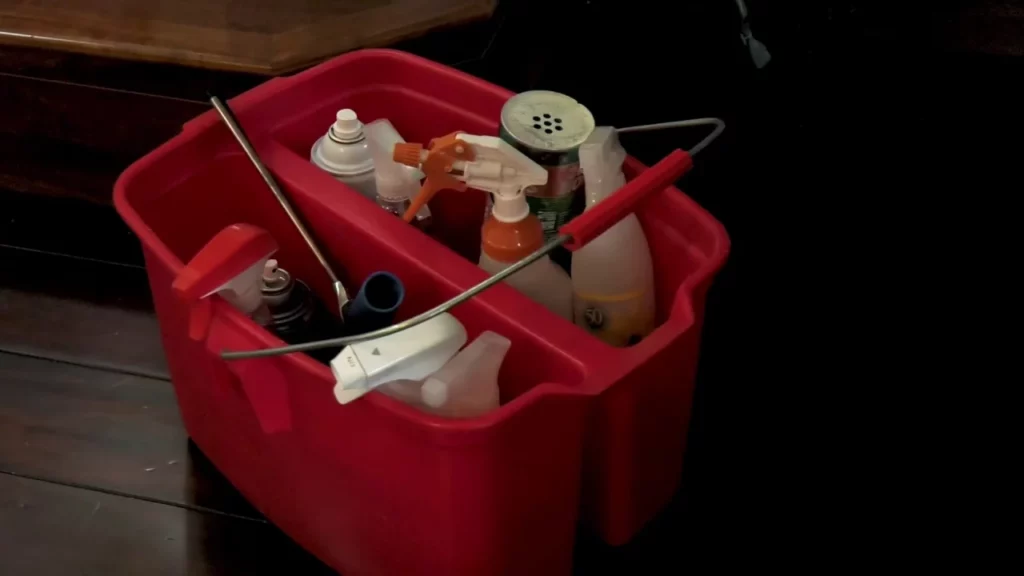
Some clients may ask you to use their personal cleaning supplies for various reasons (allergies, unique flooring, etc.), but most expect you to bring your own.
Here’s a list of the basic cleaning equipment you’ll need on day one:
- All-purpose and specialty cleaning solutions
- Broom and dustpan
- Microfiber cloths
- Mop and bucket
- Spray bottles and buckets
- Vacuum with attachments for different surfaces
And some optional tools for certain jobs:
- Carpet extractor
- High-dusting equipment for commercial jobs
- Steam cleaner
- Window squeegee and extension pole
Balance durability with cost. Cheaper tools may save money upfront but they wear out quickly, costing you more over time.
Pro tip: Create a checklist to track your inventory and avoid overspending on duplicate purchases.
Green cleaning
Green cleaning is a growing market. Using eco-friendly products and practices that reduce exposure to harsh chemicals can appeal to health-conscious clients and set your business apart. If you decide to offer green cleaning, position it as a specialty service and price it accordingly. Make sure your marketing clearly explains what’s included so clients understand the added value.
Free download: Get our cleaning material list template
Step 5: Market your cleaning business
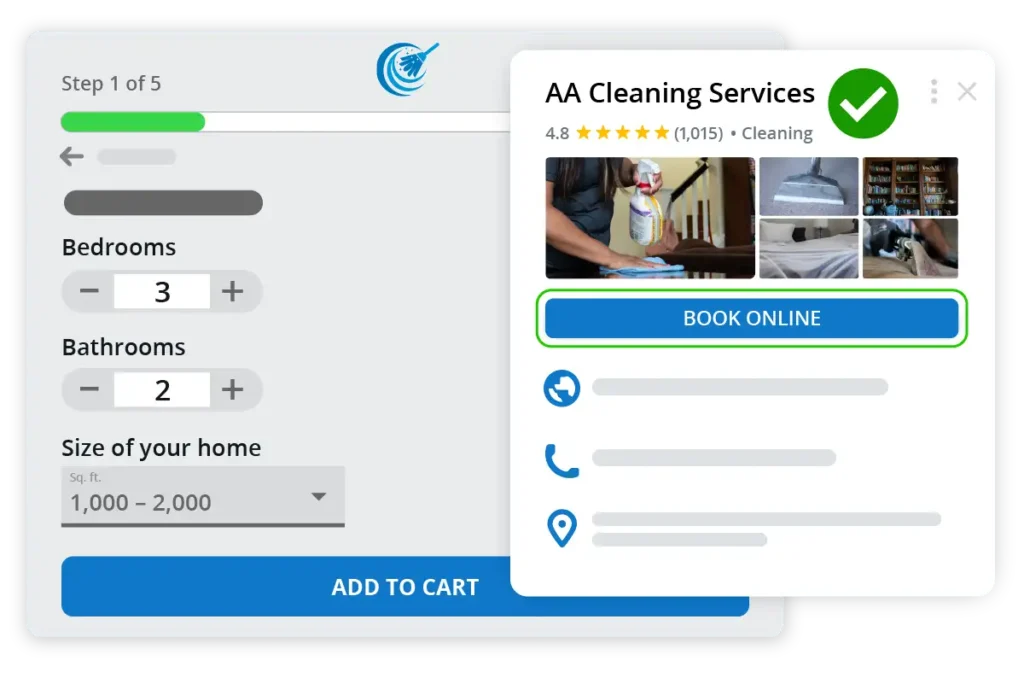
No matter how great your services are, people can’t hire you if they don’t know you exist. You need smart marketing strategies to attract new cleaning clients and build a reliable customer base.
Pro tip: Tools like Housecall Pro can help you manage your online presence, send follow ups to past clients, and track referral activity, all from one platform. Will Hardwick, CEO of A-1 Cleaning, uses tags in our app to track services and client types like “property manager” or “recurring maid.” This helps him send the right message to the right customer at the right time to increase repeat business.
Pick a business name and logo
Choose a cleaning company name and logo that are easy to remember, professional, and reflect your niche. Then, check domains and social media handles for availability so you can maintain a consistent brand. Using the same design across uniforms, vehicles, invoices, and your website builds trust and recognition.
Build an online presence
The average American spends seven hours and three minutes a day looking at a screen. If you want your cleaning business to be found, you need to be online, too.
Start with a simple website that lists your services, pricing, and contact details. Claim your Google Business Profile to appear in local searches. Stay active on platforms like Facebook, Instagram, and X (formerly Twitter), where you can share before-and-after photos, testimonials, and seasonal promotions. Regular posts and customer reviews help establish credibility.
Use offline marketing strategies
Traditional marketing is still a powerful tool for growing your cleaning business. Hardwick’s team drops “Sorry we missed you” hangers at nearby houses after each job to show neighbors that someone they know already hired his company, building trust and awareness.
Here are some other strategies to consider:
- Join new mover programs to reach people settling into new homes.
- Join new mover programs to reach people settling into new homes.
- Do door-to-door marketing, attend community events, or join local business groups to network.
- Build partnerships with real estate agents or property managers who may refer clients.
- Ask friends, family, and your first few clients to help spread the word about your services—word-of-mouth referrals are powerful.
Step 6: Find cleaning clients
Having a plan to reach clients is key to getting your business off the ground. Whether you’re targeting homeowners or businesses, use a mix of online outreach, personal networking, and referrals.
Find residential clients
Start by posting in local online groups like Nextdoor, neighborhood Facebook pages, and community forums. Use classified ads or get listed in local directories such as your chamber of commerce or regional small business sites. Offer introductory discounts or a “refer-a-friend” bonus to encourage trial and word-of-mouth. Target neighborhoods with busy families or new homeowners who are more likely to outsource cleaning.
Find commercial clients
For commercial accounts, connect with office managers, property managers, and small business owners. Use personalized outreach emails and follow-up calls, and be ready with a professional proposal. Highlight your reliability, proof of insurance, and ability to customize cleaning plans to fit client needs. Long-term contracts come from building trust and showing professionalism from the start.
Ask for reviews and referrals
Reviews and referrals build credibility fast. Ask happy clients to leave a Google review or post on Yelp and local social media groups. A few strong testimonials can tip the scales for someone comparing providers. To encourage referrals, you might offer discounts or free add-on services when clients bring in new business.
Step 7: Grow your cleaning business

Hire employees or contractors
When it’s time to grow, chances are you won’t be able to do it on your own. Bringing on employees or contractors can help. Post jobs locally or online, interview carefully, and always check references. Verify any required certifications and provide training so new hires meet your standards. A clear and structured onboarding process sets expectations and helps your new team members deliver consistent, high-quality service from day one.
Free resource: Download our employee handbook template
Use scheduling and operations tools
Managing more clients and staff can be complicated, but the right tools can save time and reduce errors. Look for software that handles scheduling, client management, invoicing, and payroll all in one place. Choose a solution that fits your business size and budget, and opt for mobile-friendly apps to manage everything on the go. Housecall Pro combines all of these features in one platform, making it easier to stay organized and grow your cleaning business.
How much does it cost to start a cleaning business?
Startup costs for a cleaning business can vary widely based on your niche, location, and business size. A solo residential cleaner will spend far less than a commercial cleaning company with employees and multiple accounts. That said, most small cleaning businesses can get started with modest upfront costs and grow gradually.
To stay on track, build a detailed budget and look for savings where possible, like buying supplies in bulk or starting with essential tools only.
Here’s a breakdown of typical startup costs for a cleaning business:
- Equipment and supplies: $50–$300/month
- Licensing and permits: $100–$500
- Insurance: $48–$173/month (general liability)
- Marketing and branding: $50–$3,000
- Initial operational expenses (transportation, uniforms, small tools): $200–$2,000
How Housecall Pro’s cleaning business software can help
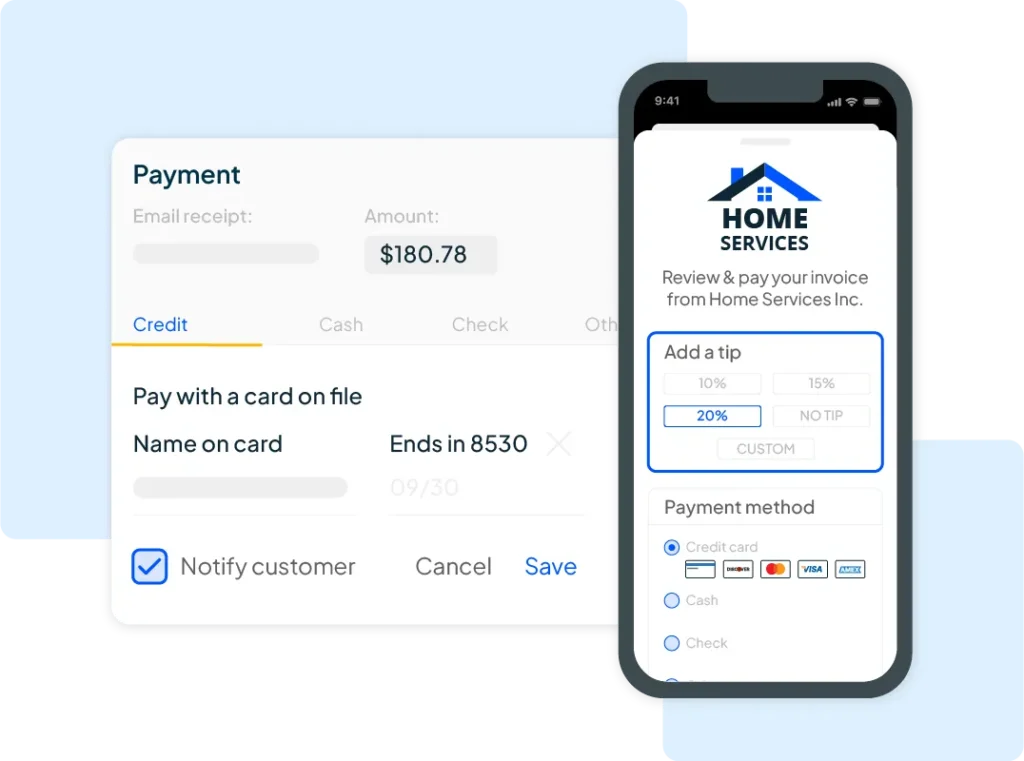
Using old-school Excel sheets and journals might have worked in the past, but there are more efficient (and far easier) paths to take today. Housecall Pro is an all-in-one platform built to help cleaning businesses save time, simplify operations, and grow with confidence.
Key features include:
- Scheduling and customer management: Book appointments, send reminders, and manage recurring jobs.
- Pricing and invoicing tools: Use built-in price calculators and templates to set rates and send professional invoices.
- Marketing and client acquisition: Track reviews, automate follow-ups, and manage referral programs.
- Operational efficiency: Process payments, complete digital forms, and access everything from a mobile app.
- Growth support: Manage employees and contractors, and expand to new areas easily.
Ready to start your cleaning business on the right foot? Try our free 14-day trial to get all the tools you need to run your business smoothly from day one.



